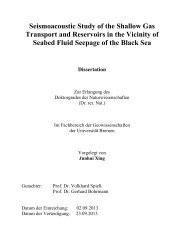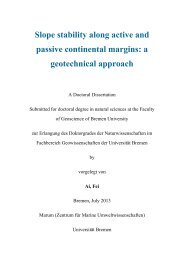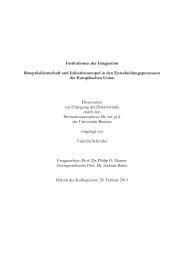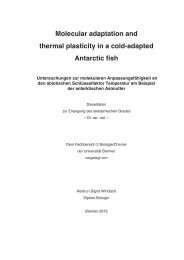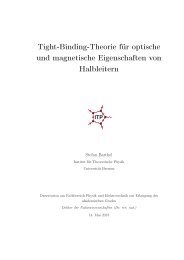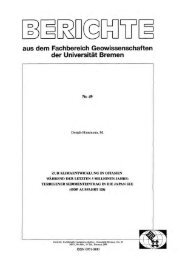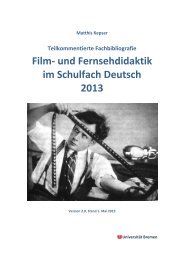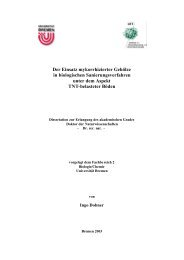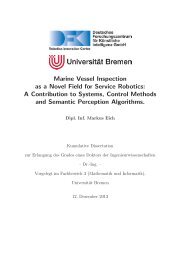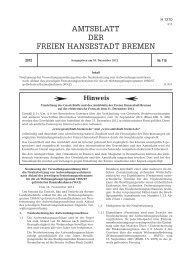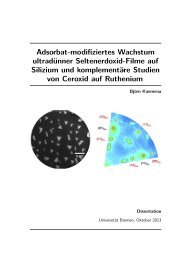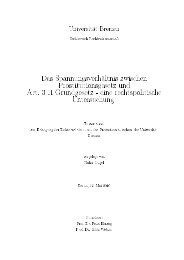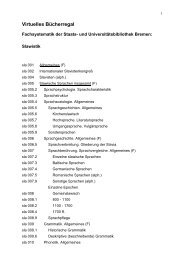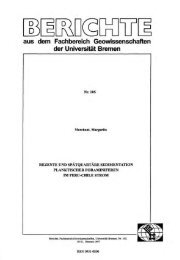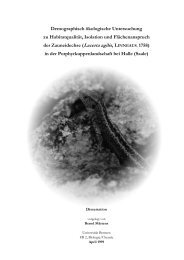aus dem MARUM und dem Fachbereich Geowissenschaften der ...
aus dem MARUM und dem Fachbereich Geowissenschaften der ...
aus dem MARUM und dem Fachbereich Geowissenschaften der ...
You also want an ePaper? Increase the reach of your titles
YUMPU automatically turns print PDFs into web optimized ePapers that Google loves.
MARIA S. MERIAN-Berichte, Cruise 20, Leg 4, Bridgetown – Freetport, 14.3.2012 – 7.4.2012 1<br />
1 Summary<br />
Leg MSM 20-4 focussed on the investigation of cold-water coral (CWC) ecosystems in the West<br />
Atlantic Ocean (Gulf of Mexico, Florida Straits) with special emphasis on their distribution,<br />
appearance, faunal assemblage and vitality <strong>und</strong>er present and past (glacial) conditions. The<br />
overarching objective was to identify the main physical and biological factors that are important<br />
in controlling CWC occurrence. Based on detailed mapping with the shipboard multibeam<br />
echoso<strong>und</strong>er and PARASOUND systems, five working areas were selected for detailed studies:<br />
(1) Campeche Bank (NE Yucatan Peninsula), (2) West-Florida Slope, (3) Southwest-Florida<br />
Slope, (4) Bimini Slope, and (5) Great Bahama Bank Slope. During 17 dives with the Bremen<br />
ROV CHEROKEE (<strong>MARUM</strong>) a detailed characterisation of the existing facies and fauna was<br />
conducted on these selected CWC occurrences. Moreover, a total of 49 CTD profiles were<br />
measured comprising single casts and three so-called Yoyo-CTDs with repeated casts over 13<br />
hours covering one complete tidal cycle complemented by bottom water samples at all sites will<br />
help to assess the recent environment of the CWC. Finally, a series of grab samples, box cores<br />
and gravity cores (total core recovery: ~60 core metres) will enable to study the development of<br />
CWC ecosystems in the West Atlantic <strong>und</strong>er changing environmental conditions, e.g., over<br />
glacial-interglacial cycles.<br />
The results of the expedition will contribute to the international TRACES initiative (Trans-<br />
Atlantic Coral Ecosystem Studies) which aims to compare the coral ecosystems of the West<br />
Atlantic with the well-known CWC sites of the East Atlantic with respect to their recent situation<br />
and a potential linkage between both occurrences regarding their temporal development during<br />
the last glacial-interglacial cycle.<br />
Zusammenfassung<br />
Im Mittelpunkt des Fahrtabschnittes MSM 20-4 stand die Untersuchung von Kaltwasserkorallen<br />
(KWK)-Ökosystemen im West-Atlantik (Golf von Mexiko, Florida Straße). Dabei lag das<br />
Hauptaugenmerk auf <strong>der</strong> Erfassung <strong>der</strong> Verteilung, <strong>dem</strong> Erscheinungsbild, <strong>der</strong> Faunenvergesellschaftung<br />
<strong>und</strong> <strong>dem</strong> Zustand dieser Ökosysteme unter heutigen <strong>und</strong> vergangenen (glazialen)<br />
Bedingungen. Nach eingehen<strong>der</strong> Vermessungen mit den bordeigenen Fächerecholotsystemen <strong>und</strong><br />
PARASOUND wurden insgesamt fünf Teilarbeitsgebiete für detaillierte Studien <strong>aus</strong>gewählt: (1)<br />
Campeche Bank (NO Yukatan Halbinsel), (2) West-Florida Slope, (3) Southwest-Florida Slope,<br />
(4) Bimini Slope <strong>und</strong> (5) Great Bahama Bank Slope. Im Zuge von 17 Tauchgängen mit <strong>dem</strong><br />
Bremer ROV CHEROKEE (<strong>MARUM</strong>) konnten detaillierte Fazies- <strong>und</strong> Faunen-Charakterisierungen<br />
durchgeführt werden. Zusätzlich wurden insgesamt 49 CTD-Profile gemessen (einzelne<br />
Messungen <strong>und</strong> sog. 13 St<strong>und</strong>en andauernde JoJo-CTDs) sowie Bodenwasserproben genommen,<br />
die helfen werden die heutige Umwelt dieser Ökosysteme zu erfassen. Schließlich werden<br />
Greiferproben, Kastengreifer <strong>und</strong> Schwerelotkerne (Kerngewinn: ~60 m) dazu dienen, die<br />
Entwicklung <strong>der</strong> west-atlantischen KWK über den letzten Glazial-Interglazial-Zyklus zu<br />
rekonstruieren <strong>und</strong> mit Klima-gesteuerten Verän<strong>der</strong>ungen <strong>der</strong> Umweltbedingungen zu korrelieren.<br />
Die Ergebnisse <strong>der</strong> Fahrt werden zur internationalen TRACES-Initiative (Trans-Atlantic Coral<br />
Ecosystem Studies) beitragen, die zum Ziel hat KWK-Ökosysteme des West-Atlantiks mit den in<br />
den letzten Jahren sehr intensiv erforschten Vorkommen des Ost-Atlantiks auf Gemeinsamkeiten<br />
zu untersuchen <strong>und</strong> mögliche Verknüpfungen zwischen beiden atlantischen Systemen zu<br />
erfassen.



